Posts by Christopher Lochhead
314 How to build a startup with Doug Camplejohn, Founder of Airspeed
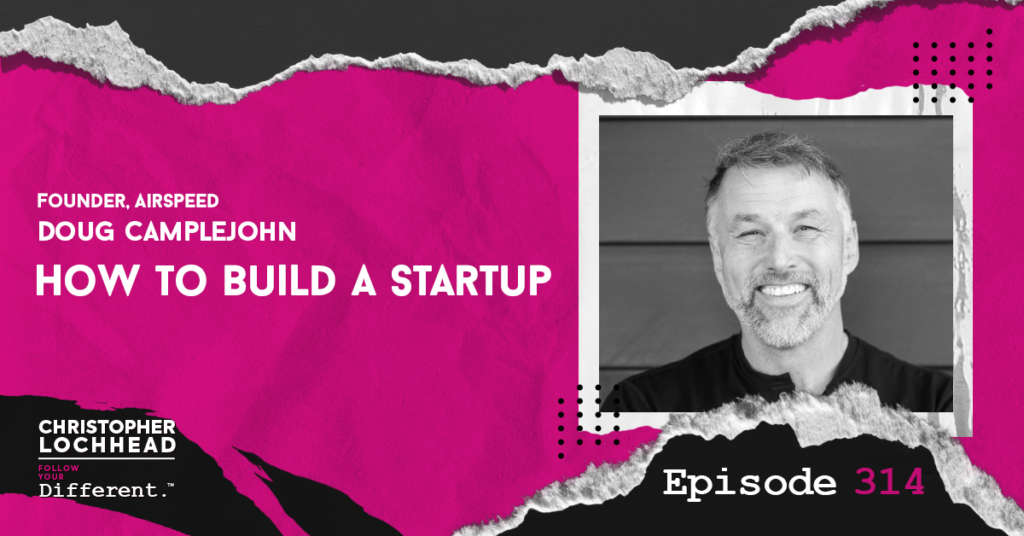
Podcast: Play in new window | Download (Duration: 1:06:40 — 45.8MB) | Embed
Subscribe: Apple Podcasts | Spotify | Pandora | RSS | More
How do you take a startup, or really any game-changing idea, from conception to launch and success in the new native digital world? And how do we connect and celebrate with our colleagues in this new native digital world? Our guest Doug Camplejohn, has given a lot of thought to both of those questions.
Doug Camplejohn is the founder and CEO of Airspeed. And it has been remarkable to see how Doug and his team has stayed true to a true north vision to solving a problem that matters, but at the same time be super flexible in both thinking, product development, and marketing.
With over two decades of experience in the tech industry, Doug has held leadership roles at some of the world’s most innovative companies, including LinkedIn, Microsoft, and Salesforce.
Pay special attention to Doug’s wisdom about why the questions, “are you having fun?” and “do you care if you get fired?” are such powerful questions, and how they can affect a person’s business decision-making.
You’re listening to Christopher Lochhead: Follow Your Different. We are the real dialogue podcast for people with a different mind. So get your mind in a different place, and hey ho, let’s go.
Doug Camplejohn on how to create a Startup
The conversation starts with Doug sharing his approach to creating a startup.
Doug explains that entrepreneurs are constantly looking for patterns and problems to solve, and he keeps a “suck list” of bad things and ideas that stick with him. He believes in being firm on the vision but loose on the details, and that good ideas don’t die but instead become something he can devote the next decade of his life to pursuing.
Doug further explains that he and his team at Airspeed started with a clear goal in mind: to make employees feel more connected and celebrated, even if the details of how they got there changed along the way.
The Trap of following the “Perfect Plan”
The importance of having a clear problem direction rather than being solely focused on a product vision is further addressed by Christopher and Doug. They discuss how some entrepreneurs can become obsessed with a particular product idea and then struggle to pivot when it fails.
Doug also believes in solving a problem that is personally meaningful and resonates with others, rather than chasing after the latest hot technology. He maintains that if the problem statement is genuine and resonates with people, the solution and approach to solving it can be flexible and evolve over time.
Product Direction vs Problem Direction
They then talk about the importance of having a problem direction rather than a product direction. They discuss how many entrepreneurs become too obsessed with a product vision and then realize they need to pivot one day. Because there are other factors to consider, from the top to the bottom of the organization.
Finding a problem that is personally meaningful to the entrepreneur and resonates with others, according to Doug, is critical. They also discuss the difficulty of changing product direction and how it affects morale. Doug believes that taking a balanced approach, planning ahead of time, and breaking it down into smaller chunks, can help with flexibility and adaptation while still maintaining a clear vision.
To hear more from Doug Camplejohn and how one could create a legendary startup from the ground up, download and listen to this episode.
Bio
Doug Camplejohn is an accomplished tech executive, entrepreneur, and startup advisor with over two decades of experience in the industry. He is the Founder and CEO of Airspeed, a platform designed to connect and celebrate employees digitally.
Prior to founding Airspeed, Doug held several leadership roles at innovative tech companies such as LinkedIn, Microsoft, and Salesforce. At LinkedIn, he was the Vice President of Product Management for Sales Solutions, where he led the development of LinkedIn’s Sales Navigator product. Doug also worked at Salesforce as an EVP and GM of Sales Cloud.
Doug is also an active investor and advisor to several early-stage startups, including Metadata.io, a B2B demand generation platform. He is a frequent speaker at industry events and has been featured in various publications such as the Wall Street Journal, Forbes, and TechCrunch.
Doug attended Carnegie Mellon University. He is passionate about leveraging technology to drive innovation and improve people’s lives, which is reflected in his work at Airspeed.
Links
Connect with Doug Camplejohn!
We hope you enjoyed this episode of Christopher Lochhead: Follow Your Different™! Christopher loves hearing from his listeners. Feel free to email him, connect on Facebook, Twitter, Instagram, and subscribe on iTunes!
174 CFO To CMO (tough times) Conversation
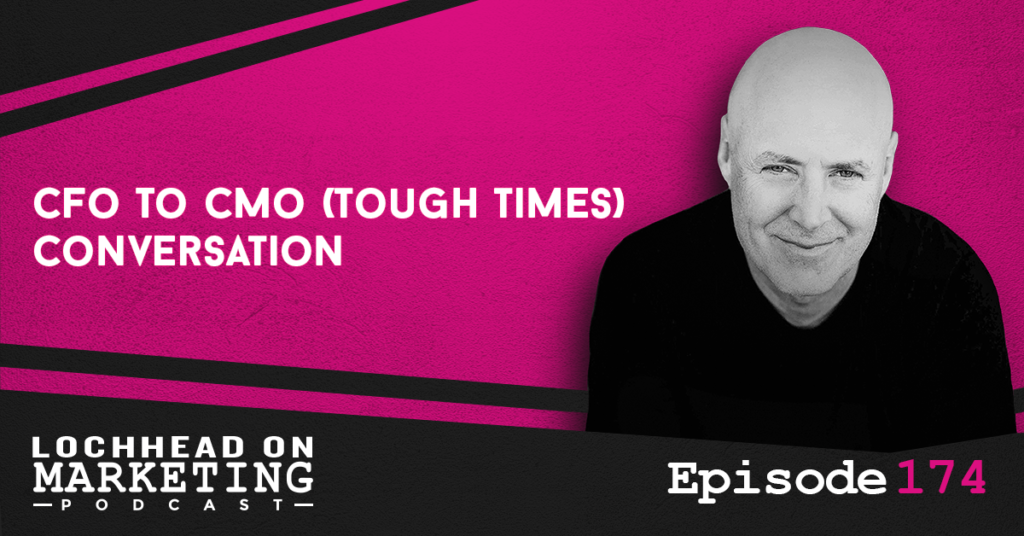
Podcast (lochheadonmarketing): Play in new window | Download (Duration: 2:38 — 1.8MB) | Embed
Subscribe: Apple Podcasts | Spotify | RSS | More
This Lochhead on Marketing episode is a short one, almost like a bedtime story with Uncle Lochhead.
I recently did a post on LinkedIn that blew up in a way that I didn’t quite expect. It was meant to be a humorous post about Marketing, but it seems to have cut quite deep in some, and others found it relatable. I thought it would be fun to read to you so we could share a few chuckles about it.
Welcome to Lochhead on Marketing. The number one charting marketing podcast for marketers, category designers, and entrepreneurs with a different mind.
The Conversation
CFO to CMO: “Our revenue is going down, so we must cut your marketing budget”
CMO: “I’m confused, Marketing is how we drive revenue?”
CFO: “The macro environment is tough and we need to cut costs.”
CMO: “But, Marketing is how we drive revenue?”
CFO: “Yes, but Marketing is the fastest and easiest way to cut costs!”
CMO: “But, if we need revenue, don’t we need Marketing more than ever?”
CFO: “Not sure what they’re teaching today at Marketing MBA school, but we’re cutting your Marketing budget 30%.”
CMO: “OK, so when revenue goes down, the best strategy is cut Marketing?”
CFO: “YES! I believe you’ve got it!”
To check out how people reacted and responded to this “conversation”, check out the post on LinkedIn.
If you like this and are interested in joining different business and marketing conversations, join us at Category Pirates today!
Bio
Christopher Lochhead is a #1 Apple podcaster and #1 Amazon bestselling co-author of books: Niche Down and Play Bigger.
He has been an advisor to over 50 venture-backed startups; a former three-time Silicon Valley public company CMO and an entrepreneur.
Furthermore, he has been called “one of the best minds in marketing” by The Marketing Journal, a “Human Exclamation Point” by Fast Company, a “quasar” by NBA legend Bill Walton and “off-putting to some” by The Economist.
In addition, he served as a chief marketing officer of software juggernaut Mercury Interactive. Hewlett-Packard acquired the company in 2006, for $4.5 billion.
He also co-founded the marketing consulting firm LOCHHEAD; the founding CMO of Internet consulting firm Scient, and served as head of marketing at the CRM software firm Vantive.
We hope you enjoyed this episode of Lochhead on Marketing™! Christopher loves hearing from his listeners. Feel free to email him, connect on Facebook, Twitter, Instagram, and subscribe on iTunes!
313 Revenue: How To Drive Growth & Prevent Revenue Leak with Andy Byrne, CEO of Clari
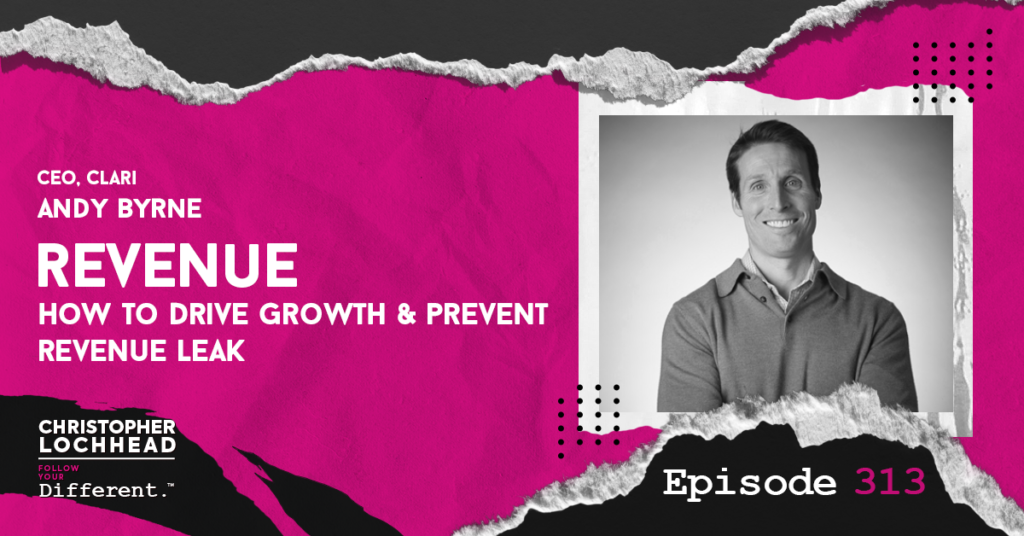
Podcast: Play in new window | Download (Duration: 1:03:24 — 43.5MB) | Embed
Subscribe: Apple Podcasts | Spotify | Pandora | RSS | More
In good times and bad, every drop of revenue matters. Without it, none of us even has a business. On this episode, we have a riveting conversation about the past, present, and future of revenue operations with Andy Byrne – the entrepreneur, CEO, and category designer of revenue operations.
Andy Byrne is the CEO of Clari, and is known widely in the industry as the prime minister of revenue. And right now, Clari is doing an extraordinary thing, and has become the category King in revenue operations.
Pay special attention to Andy’s insights into how boards and investors are now starting to focus on revenue governance. As you listen to Andy, you’ll also be getting a masterclass in how a CEO can be an evangelist for their company, and their category.
You’re listening to Christopher Lochhead: Follow Your Different. We are the real dialogue podcast for people with a different mind. So get your mind in a different place, and hey ho, let’s go.
Andy Byrne on being the CEO of a Red-hot Company
The discussion begins with Andy being asked about his experience as co-founder and CEO of a successful startup, particularly over the last three unusual years.
Andy expresses excitement about the impact his company has made, including the creation of a new job category called Revenue Operations, which is now the fastest growing and most lucrative job in the industry in the United States. He also mentions how proud he is that their platform has managed over $1 trillion in assets.
He believes they are only getting started and will have a significant impact on the world.
How Revenue Operations and the rise of AI
Andy describes how he and his team saw an opportunity in developing an enterprise system to manage the revenue business process from beginning to end. They saw revenue as more than just an outcome, but as a critical business process in need of a dedicated system. He is pleased with the effect their company has had on the lives of many people, particularly revenue-critical employees, and believes that this is only the beginning.
With regard to AI, Andy is excited about the potential of machine learning and artificial intelligence to make a meaningful impact, citing an example of their system accurately predicting a healthcare life sciences company’s $1.6 billion quarter within hours of being turned on.
The Problem with the Three-Headed Hydra
Andy then chimes in on importance of revenue and the challenges that companies face when using antiquated revenue management systems. He re-emphasizes that revenue is a business process, and it is the most important process in a company.
Unfortunately, many businesses continue to rely on the three-headed Hydra: CRM, Excel, and BI, resulting in revenue leaks, reporting leaks, and inaccurate forecasting. Christopher shares his experience working with businesses that face unexpected deals in the final days of the quarter, which can be problematic if the company’s forecasting is inaccurate. Andy agrees and stresses that using these subpar systems increases risk and should put a stop to investor interest in that stock.
To hear more from Andy Byrne and how to avoid revenue leaks in your business, download and listen to this episode.
Bio
Andy Byrne brings over 20 years of experience in sales, marketing, business development and management to his position as CEO of Clari.
Clari is the category leader in the Revenue Software Platform market, with over $1 trillion in revenue under management.
Prior to Clari, Andy was part of the founding executive team at Clearwell Systems, which he helped grow from pre-product & pre-revenue in 2005 to $100 million run rate until its acquisition by Symantec (SYMC) in Q2 2011.
Prior to joining Clearwell, Andy co-founded Timestock, Inc., which was acquired by Computer Associates (CA) via the acquisition of Wily Technology. Timestock delivered world-class enterprise application management solutions to large fortune 500 corporations.
Before Timestock, Andy was VP of Marketing at Desana Systems. Prior to Desana, Andy was VP of Product Management at Lucent Technologies. Andy came to Lucent Technologies via the acquisition of VitalSigns Software. He has also held sales, marketing & management roles at Bay Networks and at MiLAN Technologies, which was later acquired by Digi International.
Andy holds a BS in Economics from the University of Nevada and received his MBA with honors from San Jose State University.
Links
Connect with Andy Byrne!
Clari website | Clari Revenue Leak Assessment | LinkedIn | Twitter
We hope you enjoyed this episode of Christopher Lochhead: Follow Your Different™! Christopher loves hearing from his listeners. Feel free to email him, connect on Facebook, Twitter, Instagram, and subscribe on iTunes!
173 Untold lessons from the SVB bank run | Christopher Lochhead on Starting Greatness with Mike Maples Jr.
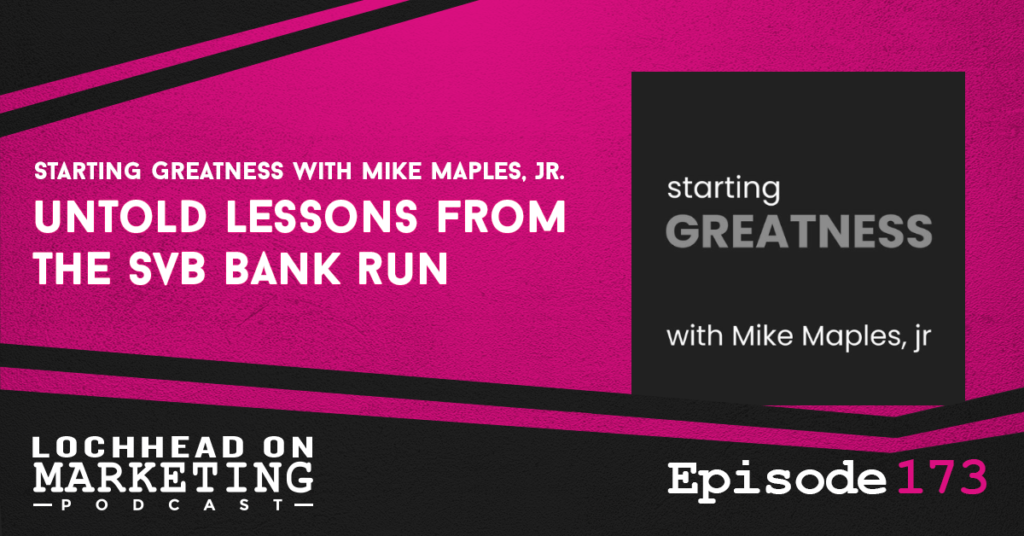
Podcast (lochheadonmarketing): Play in new window | Download (Duration: 34:24 — 23.6MB) | Embed
Subscribe: Apple Podcasts | Spotify | RSS | More
Pirate Lochhead is sailing the seven seas this week, so we’re dropping a legendary conversation that he had recently with Mike Maples Jr. and Ann Miura on the Starting Greatness Podcast.
They discuss the recent SVB bank run that lead to a variety of situations and accusations by “experts” on social media. They also discuss what lessons a Founder can learn by studying the cause and effect of such crisis and circumstances.
Welcome to Lochhead on Marketing. The number one charting marketing podcast for marketers, category designers, and entrepreneurs with a different mind.
How a crisis can make us better
Mike opens up the discussion by stating that while crisis is something we do not wish to happen on anyone, it can be a valuable source of information and introspection on what Founders can improve upon within their own companies and organizations.
No one saw it coming
Ann Miura shares that the SVB bank run has caught her completely unawares, as did most of the companies in Silicon Valley. Even those who had their teams monitoring SVB activities only caught wind of the situation a day or two before it happened, and by then it was already too late even for them.
The Difference between the Public and the Founders
Ann also observed that while people on social media and the news media are shouting doomsday scenarios and blaming each other over the situation, the Founders that she was working with at Floodgate had their head down and was busy finding ways to mitigate the situation, and looking at possible scenarios to move forward, should the SVB run not get resolved in the near future.
It showed a stark contrast on how the mind of a Founder operates in crisis situations, and it should be something that a lot of business leaders should emulate if they themselves suffer through a sudden situation that needed their immediate focus and levelheadedness.
To hear more from Mike Maples Jr. Ann Miura, and the Pirate Lochhead himself, download and listen to this episode.
Check out more Starting Greatness episodes!
Bio
Christopher Lochhead is a #1 Apple podcaster and #1 Amazon bestselling co-author of books: Niche Down and Play Bigger.
He has been an advisor to over 50 venture-backed startups; a former three-time Silicon Valley public company CMO and an entrepreneur.
Furthermore, he has been called “one of the best minds in marketing” by The Marketing Journal, a “Human Exclamation Point” by Fast Company, a “quasar” by NBA legend Bill Walton and “off-putting to some” by The Economist.
In addition, he served as a chief marketing officer of software juggernaut Mercury Interactive. Hewlett-Packard acquired the company in 2006, for $4.5 billion.
He also co-founded the marketing consulting firm LOCHHEAD; the founding CMO of Internet consulting firm Scient, and served as head of marketing at the CRM software firm Vantive.
We hope you enjoyed this episode of Lochhead on Marketing™! Christopher loves hearing from his listeners. Feel free to email him, connect on Facebook, Twitter, Instagram, and subscribe on iTunes!
312 13 Things Mentally Strong People Don’t Do with Amy Morin, One of America’s Favorite Psychotherapists
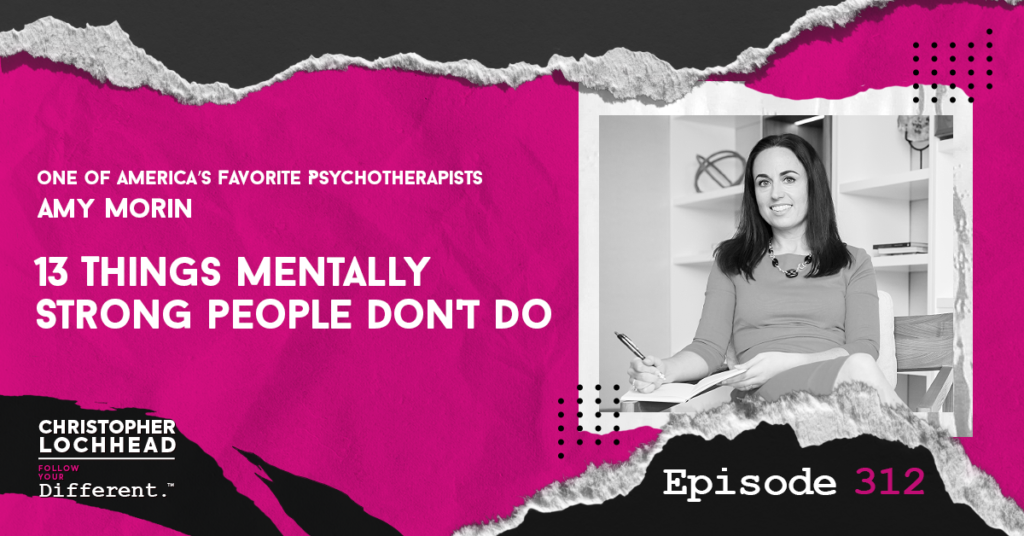
Podcast: Play in new window | Download (Duration: 53:20 — 36.6MB) | Embed
Subscribe: Apple Podcasts | Spotify | Pandora | RSS | More
Over the recent past, we’ve all been through one of the craziest, most challenging times in modern history. simultaneously, we’ve had to negotiate all of these things, inside of the context of dealing with our personal lives, our businesses, our careers, and any life challenges that we may have had along the way. So we thought that it would be great to welcome back the legendary Amy Morin, for some much needed group psychotherapy.
In less than a decade, Amy Morin has become one of America’s most popular psychotherapists. She’s just got that special quality. Amy is a person who is radically human, incredibly smart, empathetic, and surprisingly, approachable. Maybe that’s why we think she’s become America’s top or one of the top Psychotherapist and a multi-time Bestselling Author.
Her new book is out, and it’s called 13 things Mentally Strong People Don’t Do Workbook. So in this episode, we dive into all that and find out ways to tactically bolster our own mental strength as we go along.
You’re listening to Christopher Lochhead: Follow Your Different. We are the real dialogue podcast for people with a different mind. So get your mind in a different place, and hey ho, let’s go.
A Quick Update on Amy Morin
Amy has been a guest before in Follow Your Different, and since then she has written new things and accomplished so much more.
While Amy has many years of experience and success as a psychotherapist and writer, she quickly found herself with new inspiration and multiple inputs when Covid struck the world. Given the mental strain of worrying about a pandemic, the additional factor of having to stay home and people being exposed to a plethora of terrible news on TV, as well as the helplessness of being unable to do anything, did a number on everyone.
Amy realized that she was in a unique position of having the knowledge to assist and a way to share that knowledge through her podcasts and later, in print. As a result, she has written a few works on how to deal with mentally demanding situations and stress, and she recently released a workbook on how to boost one’s mental strength.
Mental Health Podcast or Therapy?
Amy shares that sometimes, their mental health podcast turns into an impromptu psychotherapy session – not just for the guest, but as well as the listeners who are going through the same situation in their own ways.
When asked about the difference between podcasting and her psychotherapy sessions, Amy admits that there are times that those two seem to blur together, yet she thinks it is important to keep a distinction.
Sometimes, the therapist in me wants to respond one way, and then I’m like, but there’s people listening. So you need to respond in another way. So I’m always very aware of that, like, ‘Oh, am I gonna respond to this a little bit differently. And I want to be empathetic’. But at the same time, I didn’t want to open up a can of worms for somebody who forgets that this is a podcast. I don’t want to ever make it seem like we’re getting them to open up in a way to then take advantage of them.”
– Amy Morin
The importance of having a healthy amount of Not-Give-A-Shit Attitude
We then talk about what it is like to have a public following, and how having a healthy amount of no-give-a-shit attitude helps wonders with their own mental health.
Amy agrees with this, and shares that she recently did a podcast about the topic of bad mental health advice you might be getting in social media. She had wanted to explore the topic more, and even go so much as contact those who posted the now-viral meme “advice”.
But she didn’t go through with it in the end. At the end of the day, all she’d gain is a migraine from arguing with people who don’t care. She would rather focus on her own inner peace and work on other topics for her own podcast.
To hear more from Amy Morin and how to bolster your mental strength to take on the world, download and listen to this episode.
Bio
Amy Morin is a licensed clinical social worker, psychotherapist, and a lecturer at Northeastern University.
She’s been dubbed the “self-help guru of the moment,” by The Guardian and Forbes refers to her as a “thought leadership star.”
Her knowledge of mental strength stems far beyond her professional experience.
She’s experienced a series of losses in her personal life that gave her first-hand insight into the strategies that build resilience.
In 2013, her article 13 Things Mentally Strong People Don’t Do was read by over 30 million people around the world.
Her best-selling book, also called, 13 Things Mentally Strong People Don’t Do, is being translated into 25 languages.
Her newest book, “13 Things Mentally Strong Parents Don’t Do: Raising Self-Assured Children and Training Their Brains for a Life of Happiness, Meaning, and Success” is a sensation.
Amy’s advice has been featured by a number of media outlets, including: Parenting, Time, Fast Company, Good Housekeeping, Elle, Business Insider, Cosmopolitan, Success, Oprah.com, Health, Fox News, US News & World Report, and The Washington Post. She has also provided on-camera interviews for Fox Business, Forbes, TheBlaze TV and an upcoming documentary with Red Bull. She’s a frequent guest on a variety of radio shows as well.
Amy serves as Verywell’s Parenting Teens Expert and Child Discipline Expert. She’s a regular contributor to Forbes, Inc., and Psychology Today.
A sought after speaker, Amy loves to share the latest research on resilience and the best strategies for overcoming adversity and building mental muscle.
Links
Connect with Amy Morin!
Amy’s Website | Twitter | Verywell Health
We hope you enjoyed this episode of Christopher Lochhead: Follow Your Different™! Christopher loves hearing from his listeners. Feel free to email him, connect on Facebook, Twitter, Instagram, and subscribe on iTunes!
172 The New Way To Create Content & Code
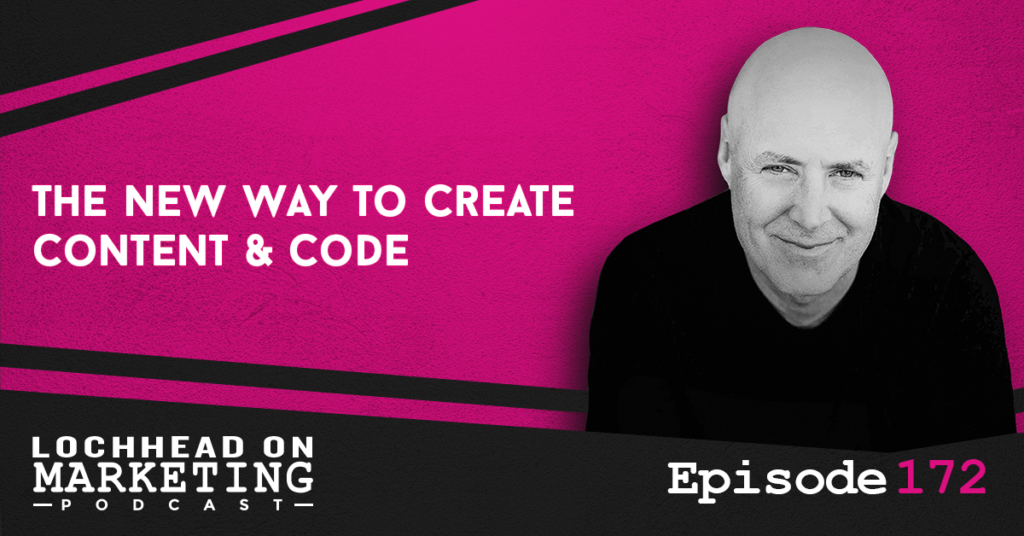
Podcast (lochheadonmarketing): Play in new window | Download (Duration: 19:36 — 13.5MB) | Embed
Subscribe: Apple Podcasts | Spotify | RSS | More
There is a fundamental tectonic change happening in the way work gets done – White Collar knowledge work to be specific.
This new technology is creating a new category of worker beyond what has been the sort of top of the pyramid, the Knowledge Workers. There’s a new layer above the Knowledge Worker emerging called the Creator Capitalist – someone who gets paid not simply to apply knowledge, but to create it. And that’s because the value of existing knowledge is dropping exponentially every day with the emergence of AI.
Today, let’s talk about how this is already becoming a radically different future right in front of our eyes, powered by chatGPT.
What is ChatGPT?
ChatGPT is the fastest growing application or website in the history of humanity by quite a lot. And while there are users that only see it as a minor amusement at the moment, people have been heavily using it for their jobs and businesses already. There are entrepreneurs, writers and other related enterprises that use it to write newsletters, blog posts, and even outlines for book ideas.
Of course, you don’t just put it the prompt and take the ChatGPT output as it is. While it is doing a pretty good job, even with niche-y things, there’s still room for improvement, as well as giving it the old human touch. But the biggest thing here is, it saves people time. Time that could be better spent on improving other aspects of your business.
How ChatGPT can innovate your craft
In terms of creating content, whether it be an blog article, newsletter, or marketing content, there is so many ways you can take advantage of this technology.
As mentioned earlier, you can use it to write first drafts to flesh out an idea you have and refine it afterwards to make it more unique and correct stuff that seem off-point to what you had in mind. You can also use in something as simple as improving the readability and format of the thing you’ve already written beforehand.
You can even use ChatGPT to learn new things before creating your content by providing it with sources and different templates on which to base the content you intend to create later.
The AI is as smart as you make it to be
While the AI has a lot of capabilities that it can do, it all still boils down to how we use it. An example would be the prompts that we give ChatGPT to execute. Being too vague or general with your prompts can yield confusing and subpar results, as multiple users have observed. So it is best to do some research from prompt engineers on how to maximize the results of your requests to the AI, so you’ll get the best quality of content or feedback all the time.
To learn more on how you can use ChatGPT and other AI technology to create content and code, download and listen to this episode.
Bio
Christopher Lochhead is a #1 Apple podcaster and #1 Amazon bestselling co-author of books: Niche Down and Play Bigger.
He has been an advisor to over 50 venture-backed startups; a former three-time Silicon Valley public company CMO and an entrepreneur.
Furthermore, he has been called “one of the best minds in marketing” by The Marketing Journal, a “Human Exclamation Point” by Fast Company, a “quasar” by NBA legend Bill Walton and “off-putting to some” by The Economist.
In addition, he served as a chief marketing officer of software juggernaut Mercury Interactive. Hewlett-Packard acquired the company in 2006, for $4.5 billion.
He also co-founded the marketing consulting firm LOCHHEAD; the founding CMO of Internet consulting firm Scient, and served as head of marketing at the CRM software firm Vantive.
Don’t forget to grab a copy (or gift!) of one of our best-selling books:
Snow Leopard: How Legendary Writers Create A Category Of One
The Category Design Toolkit: Beyond Marketing: 15 Frameworks For Creating & Dominating Your Niche
A Marketer’s Guide To Category Design: How To Escape The “Better” Trap, Dam The Demand, And Launch A Lightning Strike Strategy
We hope you enjoyed this episode of Lochhead on Marketing™! Christopher loves hearing from his listeners. Feel free to email him, connect on Facebook, Twitter, Instagram, and subscribe on iTunes!
311 The Future of American Healthcare with Dr. Ashwini Zenooz, CEO of Commure

Podcast: Play in new window | Download (Duration: 1:00:31 — 41.6MB) | Embed
Subscribe: Apple Podcasts | Spotify | Pandora | RSS | More
All of us want the best healthcare for our families, our communities, and our country. But Legacy approaches and technologies in the United States often stop our healthcare heroes from being able to deliver the legendary care they want to deliver. So let us have a dialogue about this and much more with our guest, Dr. Ashwini Zenooz.
Dr. Ashwini Zenooz is a radiologist who became the chief medical officer of the United States Department of Veterans Affairs. She then joined the technology industry, and became the chief medical officer at Salesforce.com. Dr. Ash is now the CEO of Commure, a venture-backed startup on a mission to produce a breakthrough in digital health. Her achievements thus far have been incredible, and we hope that her personal story will inspire you.
You’re listening to Christopher Lochhead: Follow Your Different. We are the real dialogue podcast for people with a different mind. So get your mind in a different place, and hey ho, let’s go.
Dr. Ashwini Zenooz on the current state of COVID
The conversation starts of with a question for Dr. Ash on the current state of COVID, particularly if we are past the crisis part of it.
Dr. Ash responds that there’s still a lot of things to look into, as COVID has not only affected our healthcare, but different parts of society and fields as well.
“I would say it’s yet to be seen. I think it’s not just the healthcare part. There’s a lot of other implications from the pandemic that were seeping into with the economy. There’s a lot of stuff that’s happening around us that’s related or as a result of the pandemic. So it’s yet to be seen. But yeah, I would say that at least the crisis is over.”
– Dr. Ashwini Zenooz
On how the US fared in the COVID pandemic
As much as it hurts to say, Dr. Ash shares that there were things that the US could have done better on. She thinks its partly because we try to “reinvent the wheel” every time there’s an epidemic or pandemic. As a society, we have had a lot of ways to learn how to properly respond and mitigate the damages, yet we tend to commit the same mistakes over and over again once it happens.
What’s even more frustrating from a healthcare standpoint is our lack of concern for future occurrences. When a major healthcare issue is resolved, it appears that no one is interested in researching how to prevent the next case, or what to do if the next one would be on a larger scale than the one before.
It’s like we only care to look back once the current one is already at our doorstep.
Dr. Ashwini Zenooz on masks and vaccines
On the topic of preventive measure, Dr. Ash was asked about what she thought about wearing masks and taking the vaccine.
For mask-wearing, Dr. Ash shares that for her, it is a personal choice. Even if airlines and public spaces don’t require you to wear them anymore, she opts to wear them because she wants to. For her, having that extra precaution for a little inconvenience is not a big deal, but she wouldn’t be offended if she sees someone not wearing one in a public place.
For vaccines, her thoughts as a layperson or a simple mom is that there would be more documentation or data available to the public on the tests that were done that passed the approval of the FDA, and have someone who can explain it to the general public. This avoids confusion and misinformation from spreading out, and less hesitation for asking assistance when someone eventually decides to finally get their vaccines.
To hear more from Dr. Ashwini Zenooz and the future of American healthcare, download and listen to this episode.
Bio
Ashwini Zenooz, M.D.
Dr. Ashwini Zenooz is the CEO of Commure, a venture-backed technology company dedicated to building a health ecosystem rooted in collaborative care and connected innovation.
Prior to Commure, Dr. Zenooz was Chief Medical Officer at Salesforce.
Dr. Zenooz was also the Chief Medical Officer at the Department of Veterans Affairs (VA) overseeing the national EHR modernization program, where she was responsible for organizational change management, business process redesign, and implementation of a new digital health platform. She has also held senior policy development and operational roles including serving as Deputy for VA Health Policy and Services, Legislative Health Policy Fellow with U.S.
Senator Richard Blumenthal, Committee Staff on U.S. Senate Committee on Veterans Affairs, and Chief of Imaging Services.
Dr. Zenooz graduated with summa cum laude distinction in undergraduate studies and received an MD in the Medical Honors Program at the University of Florida.
She completed radiology residency at Henry Ford Health System and an Abdominal Imaging fellowship at Massachusetts General Hospital.
Dr. Zenooz is board certified in radiology and continues to practice medicine today.
Links
Connect with Dr. Ashwini Zenooz!
We hope you enjoyed this episode of Christopher Lochhead: Follow Your Different™! Christopher loves hearing from his listeners. Feel free to email him, connect on Facebook, Twitter, Instagram, and subscribe on iTunes!
171 Why Treating Your Creative Marketing Like It’s Not Tied To Revenue Will Get You More Revenue | Christopher Lochhead on Modern Startup Marketing Podcast with Anna Furmanov
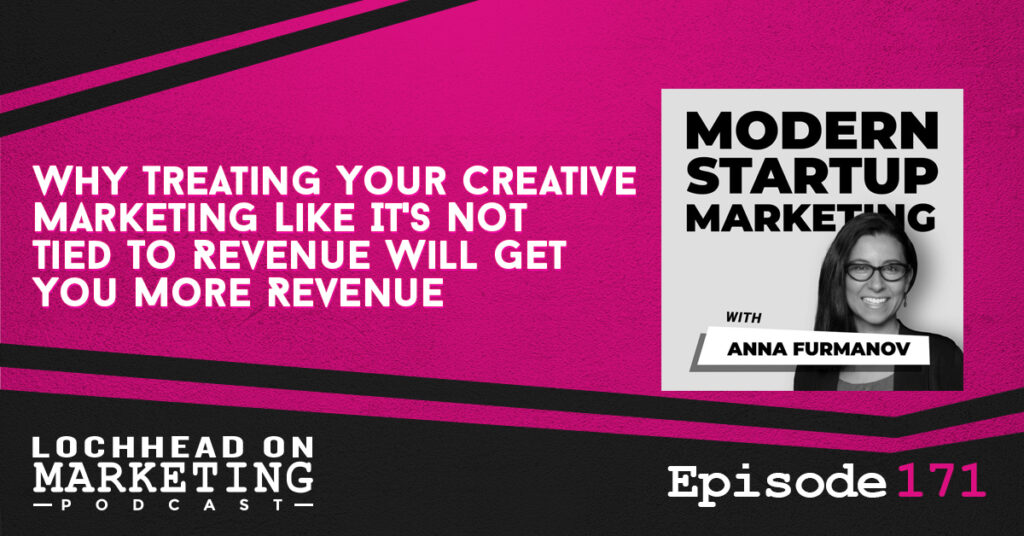
Podcast (lochheadonmarketing): Play in new window | Download (Duration: 47:25 — 32.6MB) | Embed
Subscribe: Apple Podcasts | Spotify | RSS | More
Pirate Lochhead is sailing the seven seas this week, so we’re dropping a legendary conversation that he had recently with Anna Furmanov on the Modern Startup Marketing podcast.
They discuss creative marketing category design, guns, human composting and more. Yes, human composting. Just… listen, trust me.
Welcome to Lochhead on Marketing. The number one charting marketing podcast for marketers, category designers, and entrepreneurs with a different mind.
What does “Creative” mean to you?
The conversation starts off with Anna asking for Christopher’s definition on being a creative.
Christopher shares that in order to consider something as being “creative”, it has to be something new.
“Being creative is bringing into being something that did not exist. You can take an existing thing and innovate on top of it and create something new. But at the end of whatever the creative process is, it yields a new creation. And sometimes that’s a doodle on a page. And sometimes it’s a new piece of code. There’s lots of different acts of creation that bring new things into the world. But fundamentally, I think creation is about exactly that.”
– Christopher Lochhead
On when you feel the most creative
Continuing on the topic of creativity, Anna asks when Christopher felt the most creative, whether its on a specific project, a certain period of time, or something else entirely.
“So for me, creativity, really at a high level, comes in two ways. One is just pure inspiration. Right – you’re out on a walk, you’re washing the dishes, you’re in the shower, your whatever it is you’re doing, an idea comes into your head. Because I’m a writer, I get sentences delivered to my head, and/or power ideas hiding in paragraphs. And then I’ll have to immediately get to a piece of paper or my iPhone and write that shit down. That can happen anytime, all the time. My wife will see me running across the house to grab a pen or to grab my phone and start talking to it, so I don’t forget the idea.”
– Christopher Lochhead
Thinking about thinking
One of the things Christopher pointed about how people perceive thinking is that they misconstrue having thoughts as “thinking”. Having thoughts just means an idea or a thought that pops in your head, without much effort put into it, almost like a kneejerk reaction.
Thinking, on the other hand, is actually taking that thought and processing it. It’s the suspension of that immediate and reflexive thought that one can really get into deeper details of the topic, and even find out why it elicited that sort of reaction from you and other people around you.
To hear more from Christopher Lochhead and his conversation with Anna Furmanov on the Modern Startup Marketing Podcast, download and listen to this episode.
Check out more Modern Startup Marketing Podcast episodes!
Bio
Christopher Lochhead is a #1 Apple podcaster and #1 Amazon bestselling co-author of books: Niche Down and Play Bigger.
He has been an advisor to over 50 venture-backed startups; a former three-time Silicon Valley public company CMO and an entrepreneur.
Furthermore, he has been called “one of the best minds in marketing” by The Marketing Journal, a “Human Exclamation Point” by Fast Company, a “quasar” by NBA legend Bill Walton and “off-putting to some” by The Economist.
In addition, he served as a chief marketing officer of software juggernaut Mercury Interactive. Hewlett-Packard acquired the company in 2006, for $4.5 billion.
He also co-founded the marketing consulting firm LOCHHEAD; the founding CMO of Internet consulting firm Scient, and served as head of marketing at the CRM software firm Vantive.
We hope you enjoyed this episode of Lochhead on Marketing™! Christopher loves hearing from his listeners. Feel free to email him, connect on Facebook, Twitter, Instagram, and subscribe on iTunes!
310 The Work/Life Flywheel with Bestselling Author Ollie Henderson
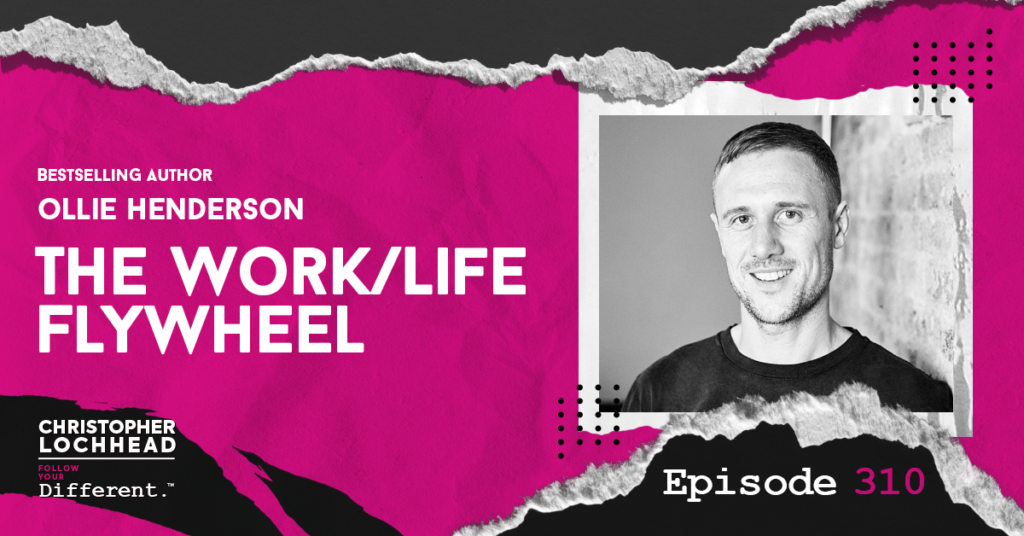
Podcast: Play in new window | Download (Duration: 1:10:26 — 48.4MB) | Embed
Subscribe: Apple Podcasts | Spotify | Pandora | RSS | More
Almost everybody wants to design a legendary life and make a difference, but it can be harder than it sounds. On this episode, you’ll get a very different conversation about designing a life with meaningful work that works for you. And who better to have this conversation than with our guest, Ollie Henderson.
Ollie Henderson is an entrepreneur, CEO, and bestselling author of the book called “The Work/Life Flywheel”. He is a great guy, and we really get into a heartfelt conversation about how we can all design the legendary life for ourselves. By the end of this episode, we hope you’ll have some new tools for living your life, your way.
You’re listening to Christopher Lochhead: Follow Your Different. We are the real dialogue podcast for people with a different mind. So get your mind in a different place, and hey ho, let’s go.
Ollie Henderson on Work/Life Balance
The conversation starts off with the two agreeing on how much they “love” work/life balance. Ollie responds that he had kept a few choice words in the book that his editor would rather not have, but it was important to the point Ollie was making.
That being said, Ollie shares that his issue with Work/Life balance is just a term people used to oversimply a supposedly complex matter in our lives, mostly due to laziness and have something easy to adhere to, like a schedule or a task to do.
“I think the thing about work life balance is that it’s a lazy feeling that we all have. It’s something we think we should adhere to. Like, ‘yeah, we should all have better work life balance’, and it kind of makes sense. It has the best intentions, but it’s frankly, wrong. It doesn’t make sense.”
– Ollie Henderson
Work vs Life
Another thing that Ollie pointed out is that the semantics of the word is also all wrong. Work/Life Balance conjures up the image of you pitting up Work versus Life; that you cannot have both at the same time, and that one of them is better than the other.
“I think when people say they aspire for work/life balance, what they’re saying is, ‘I am going to place work in life against one another, because work is bad and life is good. And if I can’t find this equilibrium, then my life is not complete’.”
– Ollie Henderson
The issue is that statement is not true for every individual, and there is no one-and-done balancing to be done. Nobody has achieved that precise equilibrium, because it doesn’t work like a countermeasure of one over the other.
Work/Life Flywheel
Christopher adds that we have to reject the notion of work and life are compartmentalized in different sections, and we somehow need to balance them on weighing scales. There is only “Life”, and we do a lot of things in that life.
So if not Work/Life Balance, what then? Ollie shares that there are some who use the term “integration” to add a new perspective to it. For him, he prefers to use the term “Flywheel”, because it entails that everything he does in life are interdependent of each other.
“It’s this idea that there isn’t a single part of your work your life that is any more important than the other; they’re all interdependent. For me, when I’m doing great work and I’m happy at work, I’m a better person, I’m a better dad, I’m a better partner. And when I’m a better partner and a better dad, that manifests more in my work.”
– Ollie Henderson
To hear more from Ollie Henderson and the Work/Life Flywheel, download and listen to this episode.
Bio
Ollie Henderson
Experienced founder and CEO, Ollie Henderson, pivoted his career while juggling the pleasures and pressures of raising a young family.
He believes work/life balance is a myth. Rather than seeing career and personal life as two opposing forces, Ollie argues that the secret is to design an integrated approach that allows them to work in harmony.
Ollie’s weekly newsletter and Top 10 Careers podcast, Future Work/Life, provides news and analysis to thousands of people interested in the future of work, covering subjects like creativity and innovation, data and technology, peak performance and workplace culture.
He’s the author of the Amazon bestseller Work/Life Flywheel: Harness the work revolution and reimagine your career without fear.
Links
Connect with Ollie Henderson!
LinkedIn | Future Work/Life Newsletter | Work/Life Flywheel
We hope you enjoyed this episode of Christopher Lochhead: Follow Your Different™! Christopher loves hearing from his listeners. Feel free to email him, connect on Facebook, Twitter, Instagram, and subscribe on iTunes!

